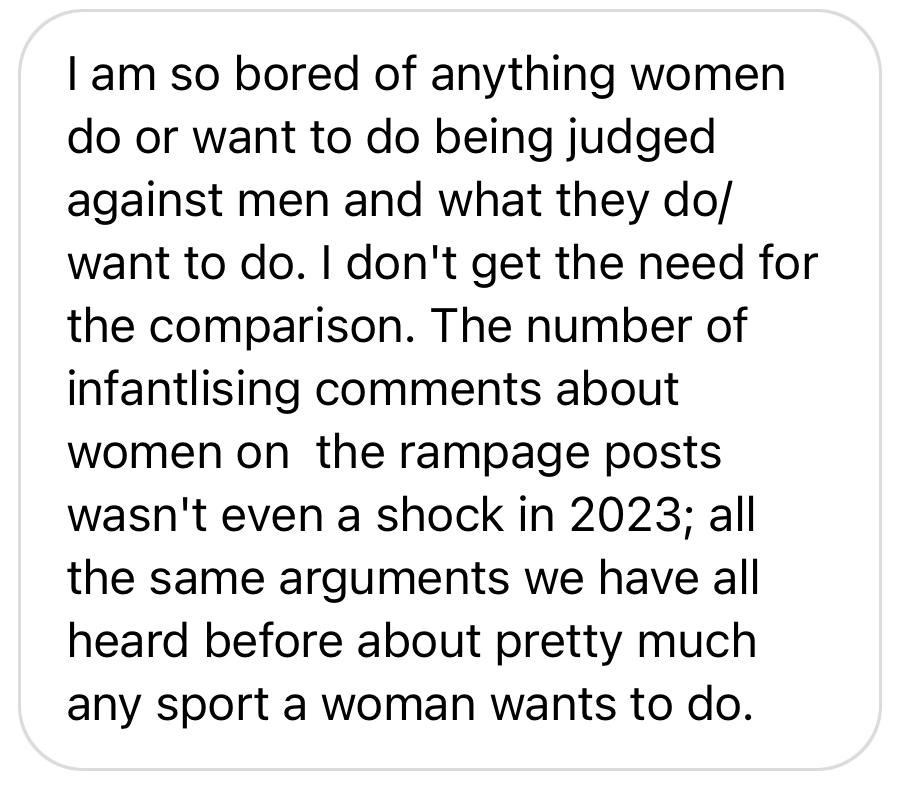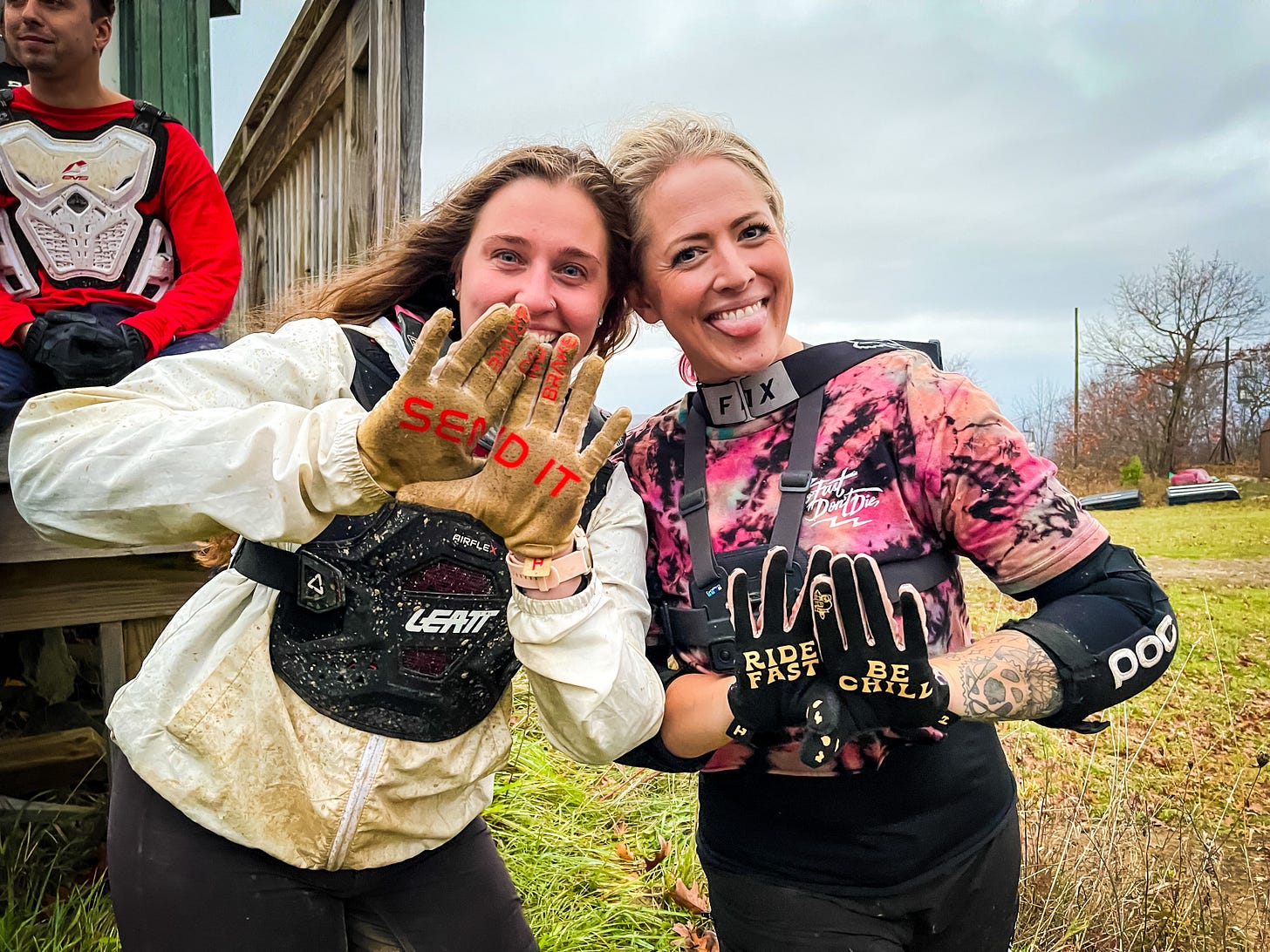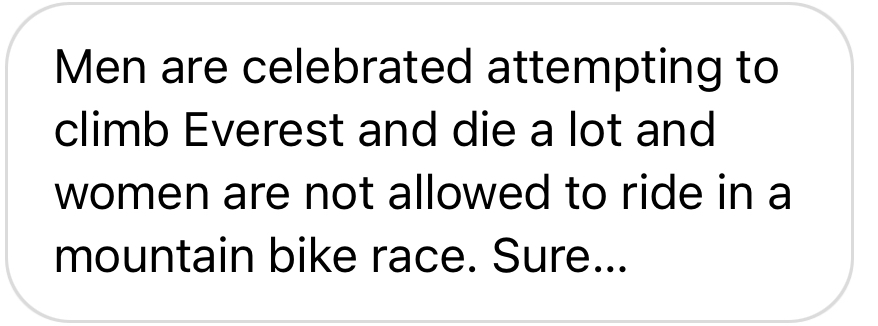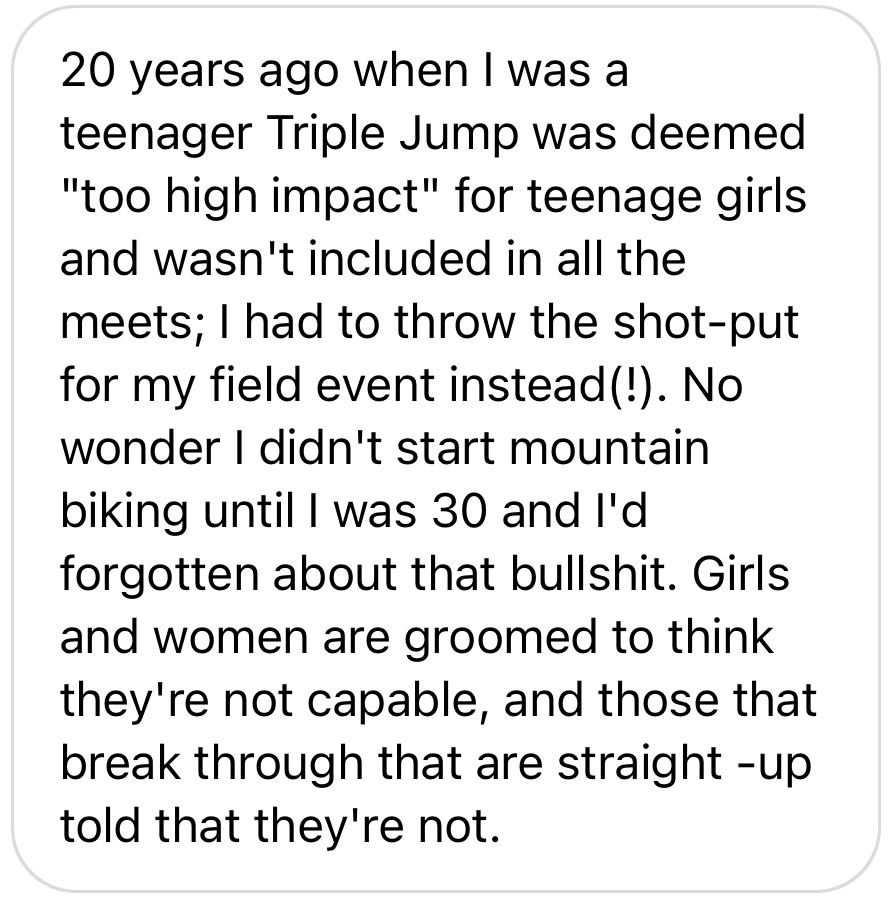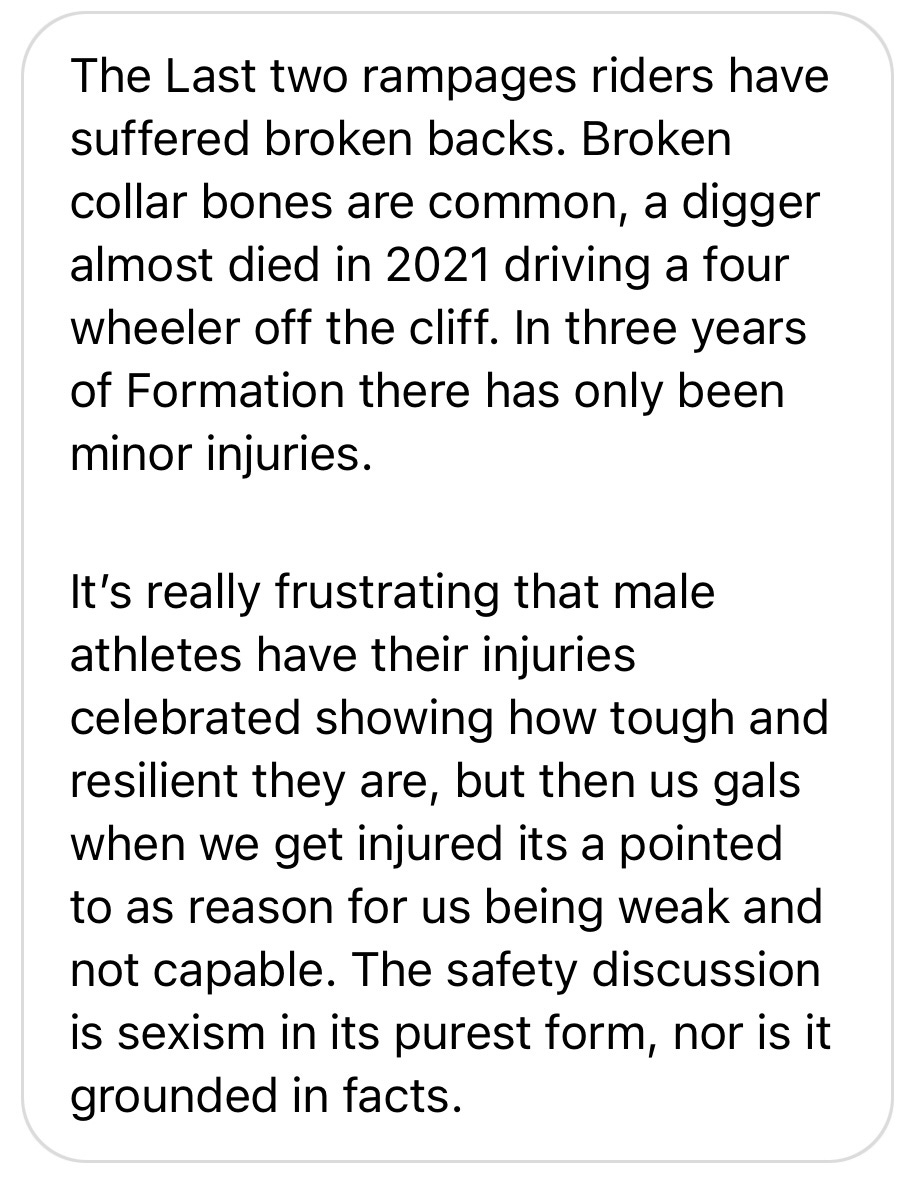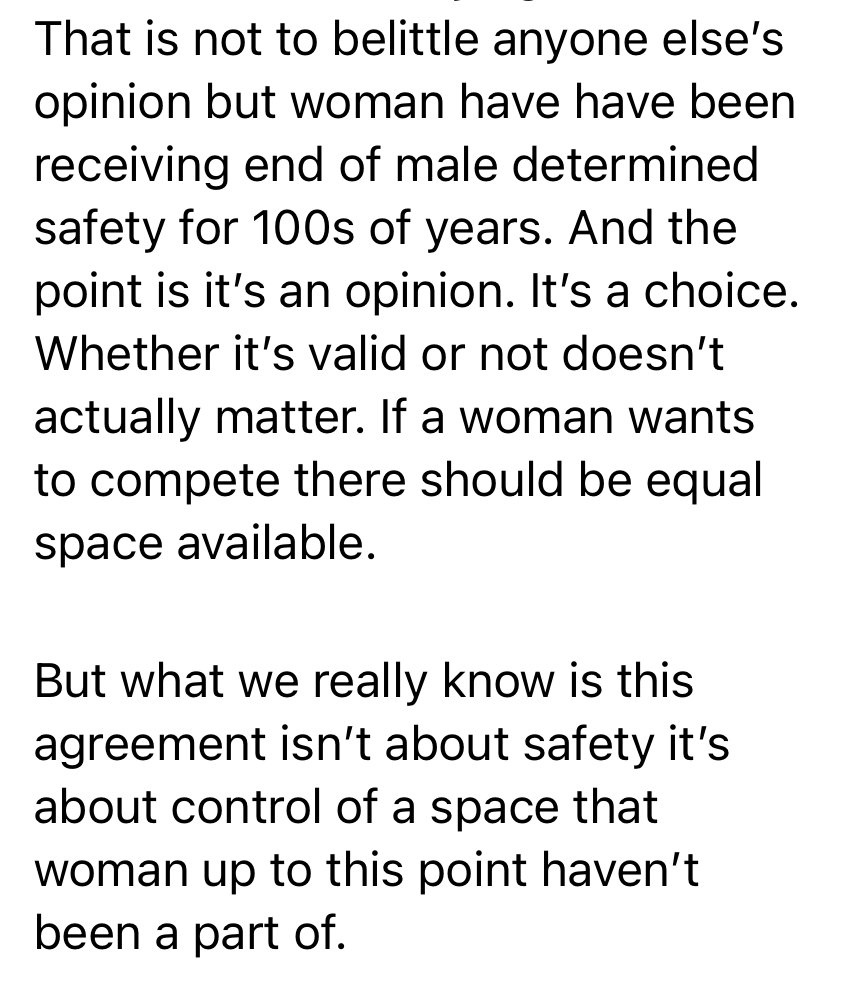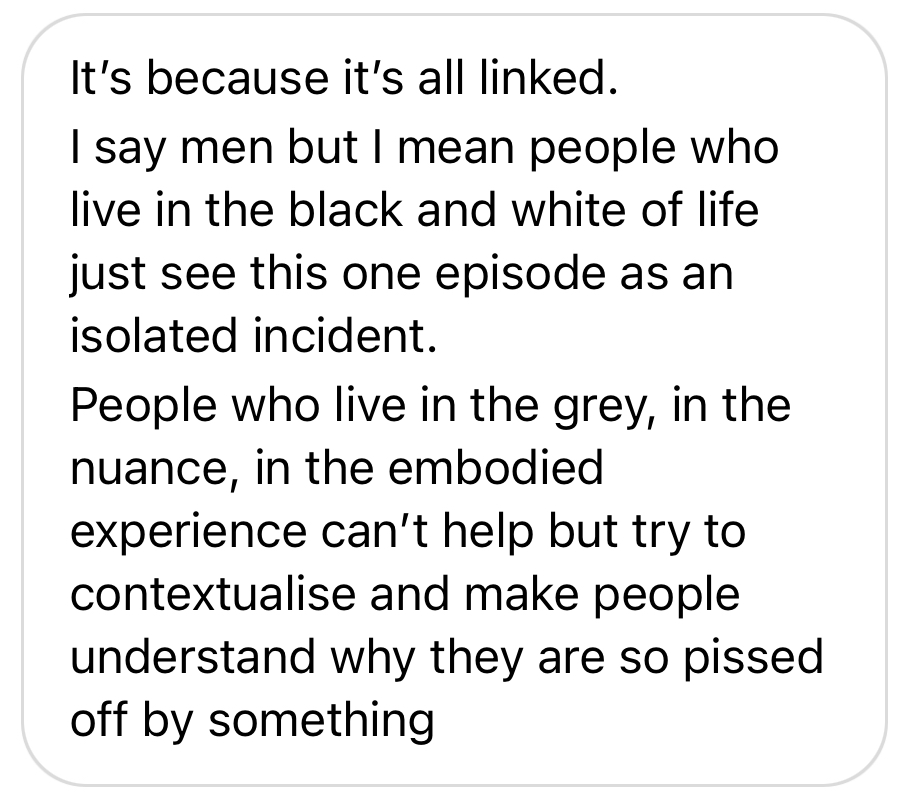Beka Stephan: Let Them Ride
One of the duo behind the @GirlsPulIUpNotOut IG meme account on lessons learned from pushing gender equity in mountain biking.
I’m really not that across mountain biking. But I have found the recent controversy around Red Bull Rampage not inviting women to this year’s event (catch up here) really interesting. Mainly because I’m fascinated by the way scenarios such as this reveal our collective blindspots, which regulars will know is a consistent theme of Looking Sideways. (Check this episode and this episode for some pertinent discussions on this).
Another reason I have been intrigued because I kept seeing the safety angle used to justify not inviting women to the event.
I’ve never understood this logic. I mean, if it’s OK for men to expose themselves to risk through activities such as surfing or mountain biking, why is it not OK for women to similarly expose themselves to risk? I honestly cannot get my head around this argument, and I’ve never seen anybody successfully make it. (And yes, that includes Laird Hamilton).
Anyway, I made a similar observation on my Instagram Stories - and spent the next 24 hours receiving, reading and reposting countless impassioned, righteous, and downright fookin angry messages from women, mountain bikers and none-mountain bikers, who are clearly very bored and tired of hearing this type of thing from men. These are the screengrabs I’ve used to illustrate this post.
5 Things I’ve Learned As A Woman Running a Mountain Bike Meme Page
I also contacted Beka Stephan, who runs the popular @GirlsPullUpNotOut Instagram page with her pal Carly Chiarella, and who is at the forefront of this whole conversation, to ask for her thoughts on the whole topic, and she wrote this blog for me. Huge thanks to Beka for taking the time to do this.
1. Humour Is a Great Way To Address Serious Issues
“We never set out to become social media influencer meme lords. Carly and I launched this account with low expectations and no commitment beyond ‘we'll post when we can.’"
As full-time healthcare professionals—Carly is a Doctor of Physical Therapy, and I am a Registered Nurse Clinical Educator—we have busy schedules. When we're not working, we're usually out riding bikes. Our sole aim was to authentically represent a woman's experience in the mountain biking community, and we found that humour was the best way to do this.
There's a set of universal experiences that women mountain bikers face, and addressing these topics through humour has proven to be both validating and enlightening for a large portion of our audience.
2. Most Of Our Followers Are Men
According to our Instagram analytics, 65% of our approximately 20,500 followers are men, aged between 25 and 34. This is both expected and surprising. Mountain biking has been a male-dominated sport for years, and while women have made efforts to establish a stronger presence over the past decade, progress has been slow and not particularly well-supported by capitalist markets. However, in the last five years or so, we've seen some small advances. More brands are gradually introducing women-specific mountain biking products, for instance, but the need for equal representation remains glaringly obvious.
That's why it's somewhat surprising to find that our meme page, which focuses on women's experiences in mountain biking, has attracted such a large male following. We don't hesitate to address well-known issues women encounter in the industry, such as unsolicited advice from men—a character we've affectionately termed "Trailside Chad," a moniker that's gained quite a bit of traction. It's intriguing to see that spotlighting this integral aspect of the female mountain biking experience still resonates with a substantial male audience.
3. We Have A Ton of Support from Men in the Industry
It's been both inspiring and empowering to frequently receive messages from men who support our mission to advance women's contributions to the mountain biking industry. The feedback we get varies widely, from "I'm an everyday guy in the sport; how can I support women in mountain biking?" to "I'm a dad with a 9-year-old daughter who loves riding bikes, and I want to help inspire her."
We believe that anyone truly passionate about mountain biking wants to ensure equal opportunities for all to progress in the sport—right from the grassroots level upwards. For us, it clear that the men in our corner want the same success for women in the sport, and that’s amazing and empowering.
4. Your Success Empowers Your Opponents
We never anticipated or sought our any level of "internet meme" popularity, however that is even measured. But as our social media presence grew, it provided us an opportunity to spotlight the issues and challenges we've encountered as women riders.
Interestingly, increased visibility and a growing following opens you up to unabashed criticism and opposition. Initially, we thought we were focusing on low-risk issues—topics that were neither politically charged nor polarising, like basic equality in sports. But it turns out, some people take offence when you pivot from making memes to advocating for something meaningful.
What interesting about that for us is that we've always been transparent that our account is managed by two women riders. Still, the idea of highlighting stories about women's progress in mountain biking was, for some, utterly outrageous. Some critics felt sufficiently emboldened to tell us exactly what they thought, often projecting a "get back in the kitchen and keep making memes" attitude. That was a surprise. While lamenting about this to a friend, she gave me this sage feedback: “If you ain’t got haters, you ain’t poppin.”
5. Women Want to Be Heard
Perhaps the most glaring revelation since launching this page is that women want to be seen, heard, and represented in the sport of mountain biking. Contrary to some misconceptions, success in this field isn't a zero-sum game; increased representation for women doesn't mean less for men. This is a critical point that I feel is often misunderstood about what we're advocating for on @GirlsPullUpNotOut.
We've used humour as an indirect yet meaningful and authentic way to address these issues. This raises an interesting question: Is it problematic that we have to infuse humour into our experiences or make others laugh for these subjects to be taken seriously? It's hard to say. But it seems that making light of our experiences has been the most effective avenue for us to advance the causes that matter most—being seen, being heard, and being represented. We still have a long, long way to go in the world of women's mountain biking, but if internet memes can help us get there, I'm 100% on board.
As ever, I would love to know what you think about this blog and the issues raised:


